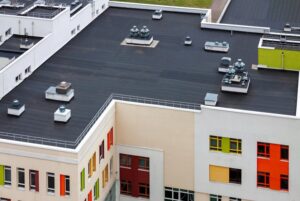 When it comes to commercial roofing solutions, flat roofing systems have gained significant popularity among business owners in Trenton, TN. This type of roofing offers a range of advantages, including cost-effectiveness, ease of maintenance, and versatility. Understanding the specifics of commercial flat roofing can help business owners make informed decisions that will benefit their properties in the long run.
When it comes to commercial roofing solutions, flat roofing systems have gained significant popularity among business owners in Trenton, TN. This type of roofing offers a range of advantages, including cost-effectiveness, ease of maintenance, and versatility. Understanding the specifics of commercial flat roofing can help business owners make informed decisions that will benefit their properties in the long run.
Understanding Flat Roofing Systems
Flat roofing systems are characterized by their nearly level surfaces, which distinguish them from traditional pitched roofs. These roofs are designed to provide a functional space that can serve various purposes, from housing HVAC systems to creating rooftop gardens. The versatility of flat roofs allows for innovative architectural designs, enabling builders to maximize usable space in urban environments where every square foot counts.
Types of Flat Roofing Materials
There are several materials commonly used in flat roofing systems, each with its unique benefits. The most popular options include:
- EPDM (Ethylene Propylene Diene Monomer): This synthetic rubber material is known for its durability and resistance to UV rays. EPDM roofs can last up to 50 years with proper maintenance. Its flexibility allows it to withstand extreme temperatures, making it suitable for various climates.
- TPO (Thermoplastic Olefin): TPO is a single-ply roofing membrane that reflects sunlight, making it energy-efficient. Its lightweight nature also makes it easy to install. Additionally, TPO is available in various colors, allowing property owners to choose a style that complements their building’s aesthetics.
- Modified Bitumen: This material is made from asphalt and is reinforced with fiberglass or polyester. It offers excellent waterproofing capabilities and is ideal for low-slope roofs. Modified bitumen systems can be installed using various methods, including torch-applied, cold adhesive, or self-adhering, providing flexibility in installation techniques.
Choosing the right material depends on various factors, including budget, climate, and the specific needs of the building. For instance, in areas prone to heavy rainfall, a material with superior waterproofing properties may be prioritized, while in sunnier climates, energy-efficient options like TPO may be more appealing.
Benefits of Flat Roofing
Flat roofs come with a host of benefits that make them an attractive option for commercial buildings:
- Cost-Effectiveness: Flat roofs are generally less expensive to install than pitched roofs, making them a budget-friendly choice for businesses. The straightforward design also simplifies construction, potentially reducing labor costs.
- Ease of Access: The flat surface allows for easier access for maintenance and repairs, reducing long-term costs. This accessibility is particularly advantageous for routine inspections and servicing of rooftop equipment, which can be cumbersome on sloped roofs.
- Space Utilization: The roof can be used for additional purposes, such as installing solar panels or creating outdoor spaces for employees. Rooftop gardens not only enhance the aesthetic appeal of a building but also contribute to environmental sustainability by improving air quality and providing insulation.
Moreover, flat roofing systems can contribute to energy efficiency by allowing for the installation of green roofs or reflective surfaces that help regulate building temperatures. This can lead to significant savings on heating and cooling costs over time. Additionally, many flat roofing materials are designed with sustainability in mind, incorporating recycled content and being fully recyclable at the end of their life cycle, which aligns with the growing trend towards eco-friendly construction practices.
Installation Process of Flat Roofing
The installation of a flat roofing system is a critical process that requires professional expertise. It involves several steps to ensure the roof is durable and effective in protecting the building.
Initial Assessment and Preparation
Before any installation begins, a thorough assessment of the existing roof structure is essential. This includes checking for any underlying issues such as leaks or structural damage. Once the assessment is complete, the area must be prepared, which may involve removing the old roofing material and repairing any damaged sections.
Installation Techniques
There are various installation techniques depending on the chosen roofing material:
- Fully Adhered: This method involves bonding the roofing membrane directly to the substrate using adhesive. It is commonly used for EPDM and TPO roofs.
- Mechanically Attached: In this technique, the roofing membrane is fastened to the roof deck using screws and plates. This method is often used for TPO installations.
- Ballasted: This installation involves placing heavy materials, such as gravel or pavers, on top of the roofing membrane to hold it in place. This method is typically used for EPDM roofs.
Maintenance of Flat Roofing Systems
Regular maintenance is crucial for extending the lifespan of flat roofing systems. Neglecting maintenance can lead to significant issues, including leaks and structural damage.
Routine Inspections
Conducting routine inspections is vital for identifying potential problems early on. Property owners should schedule inspections at least twice a year, ideally in the spring and fall. During these inspections, look for signs of wear, such as cracks, blisters, or pooling water.
Cleaning and Repairs
Keeping the roof clean is essential for preventing debris buildup, which can lead to drainage issues. Regularly remove leaves, dirt, and other debris from the roof surface and gutters. If any damage is detected during inspections, timely repairs should be made to prevent further deterioration.
Choosing the Right Contractor
Finding a qualified contractor is crucial for ensuring a successful flat roofing installation or repair. A reputable contractor will have the necessary experience, certifications, and insurance to perform the work safely and effectively.
Research and Recommendations
Start by researching local contractors who specialize in commercial flat roofing. Look for online reviews and ask for recommendations from other business owners in the area. A contractor with a solid reputation will likely provide high-quality workmanship and customer service.
Getting Estimates
Once a list of potential contractors is compiled, reach out to them for estimates. A reliable contractor will provide a detailed breakdown of costs, including materials, labor, and any additional services. Comparing multiple estimates can help ensure a fair price and quality service.
Cost Considerations for Flat Roofing
The cost of installing or repairing a flat roof can vary significantly based on several factors, including the size of the roof, the chosen materials, and the complexity of the installation. Understanding these factors can help business owners budget effectively.
Factors Influencing Cost
- Material Choice: Different roofing materials come with varying price points. For example, EPDM may be less expensive than TPO, but the long-term benefits should also be considered.
- Roof Size: Larger roofs will naturally incur higher costs due to increased material and labor requirements.
- Installation Complexity: If the roof has multiple levels, penetrations, or unusual shapes, the installation may require more labor and expertise, increasing the overall cost.
Long-Term Savings
While the initial investment in a flat roofing system may seem significant, it is essential to consider the long-term savings associated with lower maintenance costs and energy efficiency. Investing in high-quality materials and professional installation can lead to a roof that lasts for decades, ultimately saving money over time.
Conclusion
Commercial flat roofing in Trenton, TN, presents a viable and effective solution for business owners looking to protect their investments. With a variety of materials available, a straightforward installation process, and the potential for long-term savings, flat roofing systems are worth considering. By understanding the benefits, maintenance needs, and costs associated with flat roofing, business owners can make informed decisions that will enhance the longevity and functionality of their buildings.
Ultimately, partnering with a qualified contractor will ensure that the roofing system is installed correctly and maintained properly, safeguarding the property for years to come.
If you’re ready to enhance the longevity and functionality of your commercial property in Trenton, TN, with a top-tier flat roofing system, look no further than Commercial Roofing Rana. Our family-owned business, with a legacy dating back to 1983, specializes in providing superior commercial roofing services across the Mid-South. Trust in our expertise, honed over decades, and our commitment to the Duro-Last roofing systems, known for their perfect fit and exceptional protection. Don’t let the smallest leak threaten your investment. Schedule Now with Commercial Roofing Rana and secure your property with a team that values quality and reliability above all.
